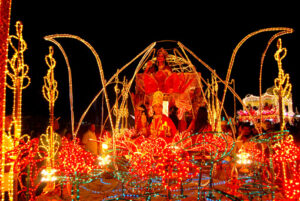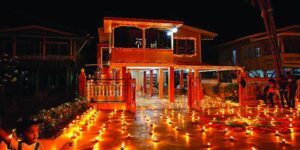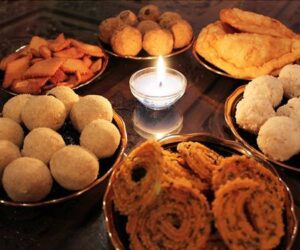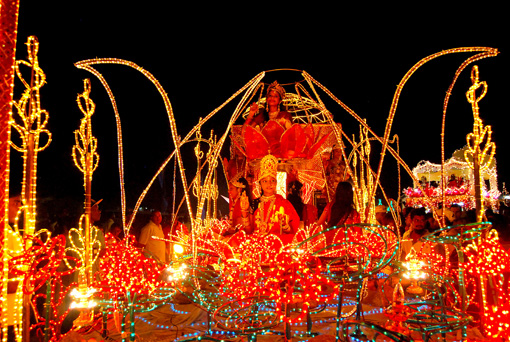By: Sueann Wickham
Diwali, also known as Deepavali, is one of the most significant festivals celebrated in India and by Hindus around the world. It is known as the festival of lights, symbolizing the triumph of light over darkness and good over evil. Over the years, Diwali has evolved in remarkable ways, embracing new cultural dimensions and resonating with many non-Hindus globally.
With the holiday being observed today, this article delves into the cultural changes that Diwali has undergone over the years as well as the profound importance of this timeless celebration.
Origins of Diwali
Diwali’s history is deeply rooted in Indian mythology and legends. The most popular narrative associated with Diwali is the return of Lord Rama to Ayodhya after defeating the demon king Ravana. The citizens of Ayodhya lit oil lamps to welcome their beloved prince, and this tradition gave birth to the festival of Diwali.
Diwali Through the Ages
Over time, Diwali has undergone transformations in how it is celebrated. While the essence of the festival remains intact, the customs and traditions have evolved. In the past, Diwali was primarily a religious festival celebrated within the confines of homes and temples. It involved rituals, prayers, and the lighting of oil lamps.
However, in recent decades, Diwali has transformed into a more national and community-oriented celebration. The streets are adorned with colorful lights, and cities compete in creating the most extravagant and artistic displays. Firecrackers, once a symbolic element, have also become an integral part of the festivities, filling the night sky with bursts of light and sound.
Diwali in the Modern Era
The festival’s significance has also transcended its religious roots. Today, Diwali is celebrated by people of various cultural backgrounds, making it a symbol of unity. It is a time when communities come together to share joy, exchange gifts, and enjoy traditional delicacies.
Businesses have also harnessed the festive spirit of Diwali. It has become a significant economic event, with companies offering special promotions, discounts, and launching new products during this season. Diwali sales have become a cornerstone of the Indian economy, further underlining the festival’s contemporary importance.

Diwali’s Global Reach
As the Indian diaspora has spread across the globe, so has the celebration of Diwali. It is not uncommon to witness the Festival of Lights being celebrated in cities like New York, London, and Sydney. Diwali has become a cultural ambassador, introducing people from various backgrounds to the rich tapestry of Indian traditions.
Celebrations in Guyana
Diwali in Guyana has a unique cultural flavor, blending the traditions of India with the Caribbean spirit.
The roots of Diwali in Guyana trace back to the arrival of indentured laborers from India in the 19th century. These immigrants brought with them their customs, including the celebration of Diwali. Over the years, Diwali has become an integral part of Guyanese culture, celebrated by both the Indo-Guyanese community and others.
One of the distinctive features of Diwali in Guyana is the harmonious coexistence of various ethnic groups. It’s a time when people from diverse backgrounds come together to participate in the festivities. The lighting of traditional oil lamps, known as “diyas,” and the decoration of homes with colorful rangoli patterns are common practices during this festival.
The Diwali motorcade is also a vibrant and colorful tradition in Guyana. These motorcades feature elaborately decorated vehicles, often with intricate Diwali-themed designs and bright lights. The motorcades move through the streets of various towns and cities, creating a visually stunning spectacle. They serve as a testament to the festive spirit of Diwali and attract enthusiastic crowds who line the streets to witness the parades.
Diwali in Guyana is a time when culinary traditions shine. It’s a time when families come together to prepare an array of delectable dishes. Traditional Indian sweets like “barfi,” “gulab jamun,” and “jalebi” are prepared in abundance. Savory treats like “samosas” and “baiganee” are also popular during Diwali. The fusion of Indian and Guyanese flavors creates a unique culinary experience that is savoured by all.
The exchange of sweets and homemade treats is a significant part of Diwali in Guyana, symbolizing the sharing of love and goodwill among friends and family. As the festival approaches, kitchens come alive with the aromas of spices and sweets, making it a time of culinary delight.
The Future of Diwali
The future of Diwali certainly seems promising. As it continues to evolve, it will likely embrace more eco-friendly practices, with a growing emphasis on sustainable celebrations. Efforts to reduce the environmental impact of things included in the celebrations like fireworks and lighting of firecrackers are also becoming increasingly important.
Animal advocacy organizations worldwide have taken a strong stance against the lighting of firecrackers during festivals like Diwali. They emphasize the distress and harm caused to animals, particularly pets and wildlife, by the loud noises and bright lights generated by fireworks.
The explosive sounds of firecrackers can lead to severe anxiety and stress in animals, causing them to flee, get injured, or even become lost. Additionally, the environmental impact of fireworks, including air and noise pollution, affects not only animals but also the overall ecosystem.
Nevertheless, it is safe to say that Diwali’s journey through the ages has been a fascinating one. From its humble beginnings in ancient India to its current status as a global cultural phenomenon, the festival has retained its core values while adapting to the changing times. As we celebrate Diwali, we not only honor tradition but also celebrate the unity it brings to diverse communities around the world and in Guyana.
Diwali is a timeless festival that remains a beacon of hope, spreading its message of light, love, and unity to all.













